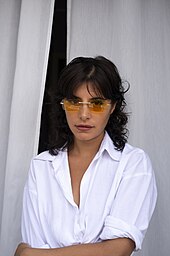Şeyda Kurt

Şeyda Kurt (born 1992 in Cologne) is a German journalist and author.
Life[edit]
Şeyda Kurt grew up in Cologne, where her grandparents had come from Turkey in the 1960s.[1] Her family is Kurdish and of Turkish origin. Even as a schoolgirl, she was politically active in migrant self-organizations such as the DIDF Youth and other political associations. From 2011 to 2017, she studied at the University of Cologne and at the Université Bordeaux Montaigne Philosophy and Romance studies. During her studies, she completed various journalistic internships and worked as a freelance journalist for Die Tageszeitung and the Kölner Stadt-Anzeiger, among others. She has also worked for various film festivals (including the Cologne Short Film Festival) and cultural events. Between 2017 and 2020, she completed a master's degree in Cultural Journalism at the Berlin University of the Arts, among others with theater critic Dirk Pilz and Bascha Mika. Between 2018 and 2020 she was a scholarship holder of the Fazit Foundation.
Kurt locates her journalistic work in the field of tension between Marxism and Queer feminist theory and practice.[2] She lives in Cologne and Berlin.
Work[edit]
Kurt works as a journalist and author for various media. From 2018 to 2019, she worked in the editorial department of Ze.tt and published numerous commentaries, reports and features during this time.[3] She wrote the column Utopia (own spelling: ❤️topia) for nachtkritik.de until April 2021. In it, she dealt with marginalized images of masculinity and femininity, among other things. She worked as an editor for the Spotify podcast 190220 – Ein Jahr nach Hanau about the racist Terroranschlag in Hanau, which was awarded the Grimme Online Award in the Information category in 2021.[4] Kurt hosted the Spotify podcast Man lernt nie aus. until 2022. Among other things, she is an author for the political feature section on Deutschlandfunk Kultur.[5][6]
In April 2021, her autobiographical non-fiction book Radical Tenderness – Why Love is Political was published, in which she outlines a concept of "radical tenderness" as a program of justice. In it, she analyses bourgeois love norms from a queer feminist, decolonial, anti-racist and anti-capitalist perspective. perspective and addresses, among other things, her own failed relationships.[7] The book reached number four on the Spiegel bestseller list, remained there for over 20 weeks and was positively reviewed by numerous media outlets.[8][9][10][11][12][13]
In March 2023, Kurt's essay Hass – Von der Macht eines widerständigen Gefühls was published. This book also became a bestseller and received positive reviews.[14] In the Süddeutsche Zeitung, for example, Aurelie von Blazekovic wrote that "after her second book [...] Kurt will probably be remembered as one of the most interesting young authors in this country."[15]
She wrote texts for the new production of Eine Volksfeindin at the Nationaltheater Mannheim, the play and her contributions were praised by critics.[16] Katharina Kovalkov-Walth writes: "The radical language of the astute journalist Şeyda Kurt knows no rhetorical taboos and digs deep into the conscience.[17]
Kurt is also a regular presenter and hosted the award ceremony for the Theaterpreis des Bundes 2021 in July 2021. She gives lectures and workshops on journalistic writing. She is regularly invited as a television and radio guest.[18]
References[edit]
- ^ Şeyda Kurt. "Kolumne: ❤️topia – Şeyda Kurt erkennt hinter den Kulissen der Insel-Überlebens-TV-Spektakel-Show „Survivor" Zusammenhänge der Gewalt". nachtkritik.de (in German). Retrieved 2021-09-02.
- ^ Sebastian Friedrich. "Şeyda Kurt: „Hass kann Menschen aus der Ohnmacht holen"". NDR.de (in German). Retrieved 2023-04-15. Interview mit Şeyda Kurt
- ^ "Redaktionsprofil von Şeyda Kurt". Die Zeit. Retrieved 2021-08-07.
- ^ "190220 – Ein Jahr nach Hanau" (in German). Retrieved 2021-08-07.
- ^ "Diskurskultur – Wenn Moraldebatten wichtige Fragen übertönen". deutschlandfunkkultur.de (in German). Retrieved 2023-04-15.
- ^ "Quiet Quitting – Die neue Arbeitsmoral der Millennials". deutschlandfunkkultur.de (in German). Retrieved 2023-04-15.
- ^ Shoko Bethke (2021-09-07), "Dating außerhalb der eigenen Bubble: Rendezvous mit Jungen Liberalen", Die Tageszeitung: taz, ISSN 0931-9085, retrieved 2021-09-08
- ^ Elisabeth Gamperl. "Şeyda Kurts Buch „Radikale Zärtlichkeit – Warum Liebe politisch ist"". Süddeutsche Zeitung (in German). Retrieved 2021-08-07.
- ^ Inga Dreyer. "Ein alternatives Alphabet der Liebe (neues deutschland)" (in German). Retrieved 2021-08-07.
- ^ "Seyda Kurt: „Radikale Zärtlichkeit – Warum Liebe politisch ist"". rbb-online.de (in German). Retrieved 2021-08-07.
- ^ "Twist – Warum ist Liebe so schwer? – Komplette Sendung" (in German). Retrieved 2021-08-07.
- ^ Bayerischer Rundfunk Andreas Krieger (2021-07-17), Seyda Kurts Buch: „Radikale Zärtlichkeit – Warum Liebe politisch ist“, retrieved 2021-08-07
- ^ "Şeyda Kurt: „Radikale Zärtlichkeit"" (in German). Retrieved 2021-08-07.
- ^ "Wer hat die Macht zu hassen? In ihrem neuen Buch „Hass" fragt Seyda Kurt nach Kontext und Sinn eines widersprüchliches Gefühl". SWR.de/SWR2 (in German). Retrieved 2023-04-15.
- ^ Aurelie von Blazekovic (2023-04-14). "Nah am Anderen". Süddeutsche Zeitung (in German). Retrieved 2023-04-15.
- ^ "Eine Volksfeindin" (in German). Nationaltheater Mannheim. Retrieved 2023-04-15.
- ^ Katharina Kovalkov-Walth. "Eine Volksfeindin – Nationaltheater Mannheim – Katrin Plötner und Şeyda Kurt spitzen Henrik Ibsen zu" (in German). Retrieved 2023-04-15.
- ^ "Deutschlandfunk – Streitkultur" (in German). Retrieved 2021-08-07.
